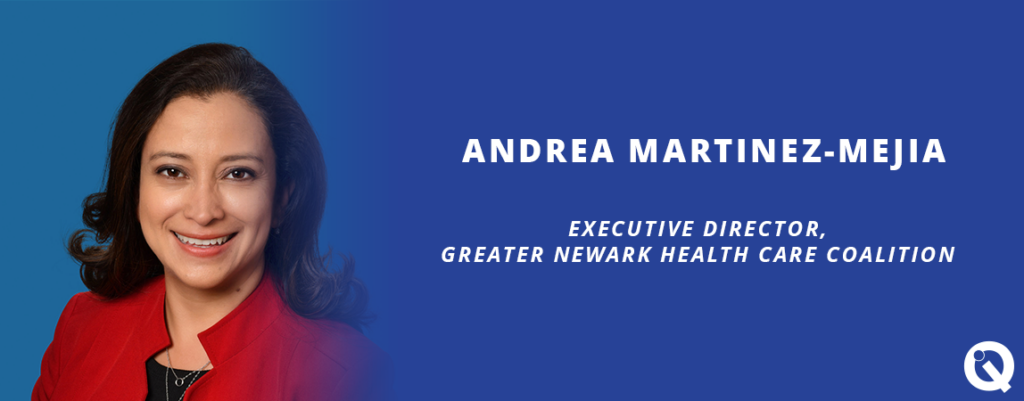Andrea Martinez-Mejia is the new executive director of the Greater Newark Health Care Coalition, one of the original Medicaid Accountable Care Organizations and now a Regional Health Hub. The Coalition has worked closely with the Quality Institute for many years.
What is your vision for the future of the organization?
Being the Coalition’s new Executive Director is a homecoming for me. I lived in Newark for many years; I attended East Side High in the East Ward and Rutgers, Newark, for my undergraduate degree. Having the opportunity to work alongside many partners to improve the health of the greater Newark community is truly an honor. I hope the organization is seen as a strategic partner aiming to collaborate to address the many barriers that prevent the residents of our cities from accessing equitable, quality health care. I want to continue the work and lead the way in addressing the barriers to equitable, quality care for all residents of the city.
New Jersey’s Regional Health Hubs were highlighted in the White House’s first ever playbook to address social determinants of health. How significant is that recognition?
This recognition is significant for all Regional Health Hubs because it highlights the work they have been doing and advocating for through the years. It is the acknowledgment that for communities to thrive, backbone organizations like the hubs need to be trusted and supported to carry out the community health activities required to improve access to health care and to advance the regional network of organizations working together to address social determinants of health. The importance of collaborating across sectors and having coordinated approaches to address community needs is what makes the regional health hubs a key partner in addressing health equity.
The playbook highlighted the need for data gathering and support, flexible funding, and support of backbone organizations. How do you see these pillars coming together to support community health?
If we want to decisively address health equity and social determinants of health in a holistic way, all these pillars are important. We need good health and social data points that inform us what is happening in our communities that have an impact on health outcomes and vice-versa. Funding for community health must be more flexible for the community health infrastructure to be sustainable long-term. Many of the innovations and interventions at the local level are not quick fixes, but rather are the result of ongoing interactions and interventions across various sectors for multiple years; hence the need for multi-year, flexible spending for community health infrastructure, sustainability, and workforce development.
You have worked in New Jersey state government for many years, including as Chief of Staff at the New Jersey Department of Health. How will that experience influence and inform your work in your new role?
Working for the public sector my entire career, including many years in State government, has taught me the importance of being accountable to the people we serve: our constituents, stakeholders, partners, and leaders. I have so much to draw from my experience as Chief of Staff at the Department of Health, primarily the understanding that we have to address the needs of our communities holistically. We cannot ignore the environment and socio-economic circumstances that make it difficult for our communities to achieve health. Therefore, addressing not only the health barriers but also the social determinants is imperative. I also learned the importance of partnerships and collaboration to achieve goals. As the Pandemic showed us, we did much better when we all collaborated and worked together to defeat the enemy or “flatten the curve.”
Finally, we like to ask a question beyond a person’s professional work. If you could choose anyone (throughout history or alive today) who would be your hero?
All the strong, determined, passionate women who have helped shape my life somehow, starting with my mother. She has been my first teacher and role model. From her, I have learned the importance of hard work and determination to achieve goals. She always reminds me, “You must leave footprints wherever you go.” She means that we must leave something positive in every place we go. As we say now, leaving a place better than you found it. There are too many women to list, but I can tell you that I have met, worked for, and worked alongside some incredible women leaders in my career who have mentored, motivated, moved, and pushed me to be the better version of myself. Every woman striving to improve our communities’ lives, young and old, is my hero.

